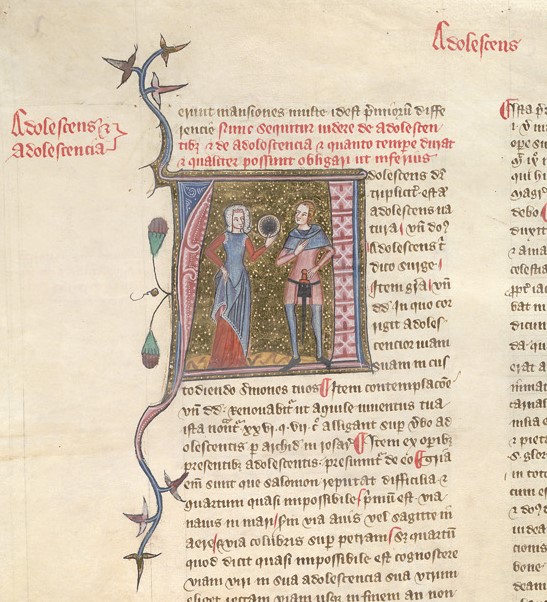'An Adolescent in Service to a Knight’: Adolescence and Aspects of Belonging, c. 1050–1250
Dr Emily Joan Ward
Thursday 15 December 2022
Throughout medieval Europe, the Latin concept of adolescentia, ‘adolescence’, held a central place within intellectual frameworks which attempted to make sense of humanity’s place in the world. Adolescence was perceived to be a time of great potential, when an individual’s action, behaviour and character could easily be moulded and shaped by parents, teachers and other adults. But the years immediately post-childhood could also be moments of change and uncertainty. Among the collection of miracles of St Margaret of Scotland likely compiled in the mid-thirteenth century, is the story of an adolescent (adolescens) placed in knightly service.
Although the miracle story is brief, it provides a starting point for exploring adolescent acceptance and participation within families, households and communities, both in Scotland and elsewhere. Situating the sparse record of this young man’s life in a wider, comparative context, this talk examines aspects of the interrelationship between age and belonging across medieval society. Young peoples’ experiences of inclusion and exclusion varied widely, but adolescence could be an especially crucial time for navigating shifting social bonds and relationships, developing individual and group identities, and fostering attachments to communities and spaces.

Adolescent Man and Woman, The British Library, Royal MS 6 E VI, fol. 58v.
Dr Emily Joan Ward is a British Academy Postdoctoral Fellow at The University of Edinburgh, where she will take up a lectureship in Medieval Scottish History from 2024. She is a comparative historian of central medieval Scotland and Europe and the author of Royal Childhood and Child Kingship: Boy Kings in England, Scotland, France and Germany, c. 1050–1262 (CUP, 2022). Her research touches on themes such as life cycle and gender, rulership and authority, and documentary culture and historical writing.